#osr
Explore tagged Tumblr posts
Text
how to run an OSR game
a while back i made this post to help people who were interested in OSR games but didn't know where to start, explaining the general design philosophy and going over a bunch of different OSR rulesets you can run a game with. so this is a follow-up post about how to actually run these (especially bc not all of them have much actual GM guidance)
note this is a highly opinionated post and some people from the more meatgrinder-y end of the OSR might take issue with this. but this is advice that works extremely well for my games.
how to prep situations and not plots
this is good advice for most games but OSR especially because OSR gameplay is so driven by player scheming: don't ever include "and then the players will..." in your prep, because you do not know what the players will do.
if your prepped scenario hinges on the players taking a specific action or the whole thing falls apart, you're digging your own grave as the GM. trying to account for every action the players can take is a trap, because players are creative and clever and their options are only limited by their ideas. that's the game.
so "prep situations, not plots" has become popular advice in TTRPG communities, especially OSR circles. but how do you actually do that
the most important elements of prep you want to figure out are:
what do all the NPCs involved in this scenario want? what social levers (wants, fears, habits, allegiances, guilty pleasures, relationships) do they have that the players can pull?
what will happen if the PCs never interfere? what conflicts and schemes are brewing in the background?
what locations are there to explore? who and what is inside them, what dangers and treasures are inside?
the best prep is stuff you can't improvise, or stuff that's unsatisfying when improvised. you should probably know monster stats ahead of time, know the layout of dungeons, that sort of thing. elements relevant to challenging the players are important to prep.
stop rolling for everything
coming from nearly any other TTRPG to an OSR game, your instinct when a player says "i want to do X" is "okay, make an X roll" through a skill system or a pbta move or something.
if you do this in an OSR game, you run into problems.
player characters aren't very strong. they have single-digit hit points, few if any class abilities, and whether they're carrying a crowbar, a grappling hook, a lantern, etc. is as impactful as their choice of class.
this is because the game is about using your head more than using your character sheet - the sheet just lists tools to apply your creative thinking to. scheming and managing your resources is the game.
and this means if a player has a clever idea, you should almost never reward them with a die roll to see if they succeed. a skill check is just a random chance of failure. instead most actions should succeed or fail automatically.
here's a good checklist to determine whether something succeeds:
is it something a normal, untrained person could do? if yes, you succeed.
could a normal person do it with the right tools, training and/or time to work? if yes, you succeed if you have any of those things.
if you don't have any of those, you can't. find another approach or get ahold of those conditions for success.
die rolls are for resolving uncertainty and risk. picture a version of 5e where there are no ability checks, only saving throws - dice you roll when something's gone wrong and you're in danger.
which leads into the next point...
communicating information
one of the worst sins of roll-based task resolution is when it's used to determine perception. players making informed decisions is the heart of the game, and they can't do that without information.
give information freely. if your character could know it, they probably do. try to do this too much. never gate information behind a die roll, especially the PC's surroundings.
part of this is always informing the player what is at stake. if a player's in a dangerous enough situation that success comes down to a die roll, you must let them know that before they opt into making that roll, and what the consequences for failure are.
OSR games are about risk management, so tell your players what is at risk when they make those decisions.
entering combat
combat is one of the most dangerous things in an OSR game - it's unpredictable, lethal, and entering it is always a big decision.
if you're coming from a game like 5e, often your first instinct when an encounter occurs is, "roll initiative!" but this is a mistake. you always, even when combat is about to start, ask players for their approach. do they fight? flee? negotiate? surrender?
because combat is so risky, forcing players into it unprompted fundamentally changes the dynamic of your campaign. keep in mind, once combat starts, you don't get any input between rolling initiative and taking your turn. your fate is up to the dice - your tactics matter, sure, but they can't save you from losing initiative, being crit, and dying from bad luck.
if players willingly choose combat as their approach, they should know the risks and what they're getting into. sometimes combat is the best way to achieve your goals, so it'll still happen.
#osr#nsr#d&d#ttrpg#also OSR stands for “old-school renaissance” since someone brought up in my last post that i never clarified that
49 notes
·
View notes
Text

Just to experiment a bit, I'm adding color, in a risograph style, to these tiny wizards.
#riso#risograph#artists on tumblr#drawing#illustration#art#risografia#dnd#ttrpg#ttrpg art#fantasy#fantasy art#osr#artwork#comics#character design#procreate#draw#ilustracion#dibujo#digital art#rpg#indie games#comic#npc#dungeons and dragons
50 notes
·
View notes
Text

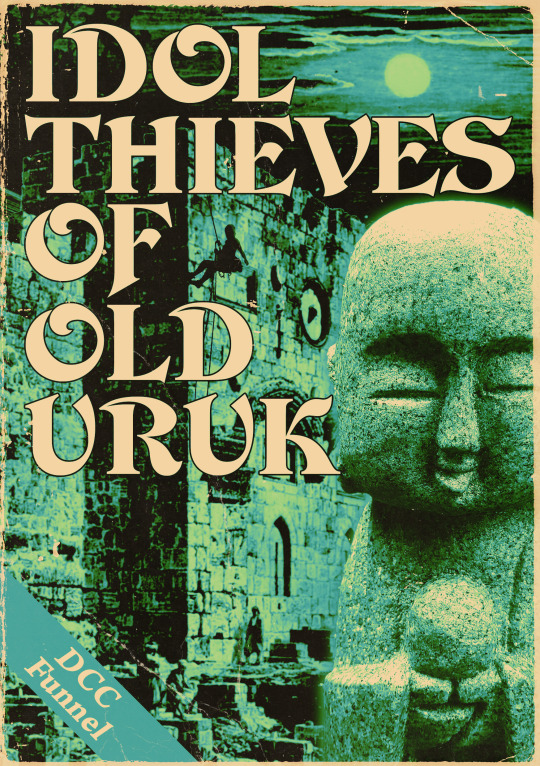

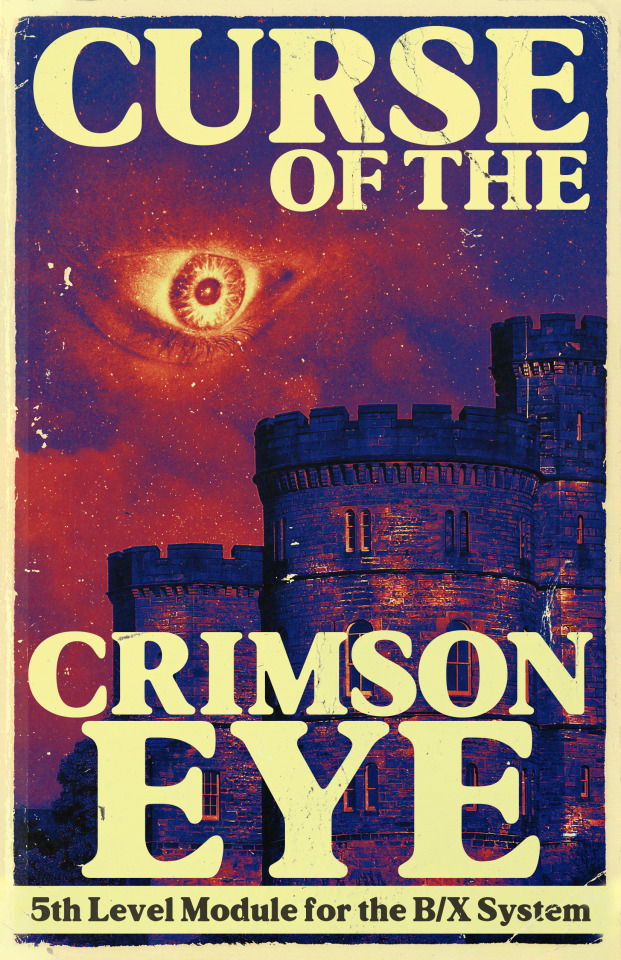
The Pulps!
I've got a project coming up and as preparation I'm trying to get better at emulating that '70s beat up paperback look using Photoshop.
These images use techniques like photo collage, reticulation noise, gradient mapping, and texture overlays.
They use free images from Unsplash and The NYPL Digital Collections. Free fonts from Fontesk. Plus lots of info from YouTube tutorials like TextureLabs and Spoon Graphics.
It's been really fun so far!
13 notes
·
View notes
Text
Have yet to get to Mothership on the long list of sci-fi horror RPGs I want to run, but I have this clawing suspicion that this'll be a helpful resource and a half.
Mothership Playkit
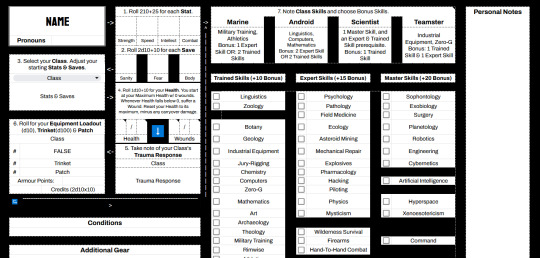
I've got another Google Sheets Playkit for folks, this time for Mothership!
Mothership is an OSR space-horror game by Tuesday Knight Games, and is inspired by movies like Alien. It has oodles and oodles of interesting modules for you to run for you crew, the most recent of which were submitted to the TripTech Game Jam back in May!
I tried to replicate the way the character sheet guides you through character creation, although I had to upload a second tab just to illustrate how the different skills are connected to each-other. I also included my typical Safety Tools Sheet, which has a link to the game and my bog-standard section of Lines, Veils & Lures!
You can check out the playbook here...
...and you can take a look at my entire playkit library at the link below!
Clicky.
#ttrpg#mothership#sci-fi#sci-fi horror rpg#ttrpg resources#ttrpg community#mothership rpg#mothership resource#OSR#OSR ttrpg
54 notes
·
View notes
Note
Was watching a video of people playing R.E.P.O., the players struggling to move a tall, thin box that gains damage if not kept upright, and was suddenly struck by the memory of posts you've made about old-school D&D having segments regarding the logistics of getting loot out of dungeons.
... I don't really have any greater thought to expound on there, unfortunately.
I maintain that you haven't truly played old-school Dungeons & Dragons until you've found yourself trying to to recover an 11th Dynasty aristocratic dining table from the fifth level of a dungeon without scratching the finish and all of the encumbrance, travel, light source, and random encounter rules are in play.
3K notes
·
View notes
Text
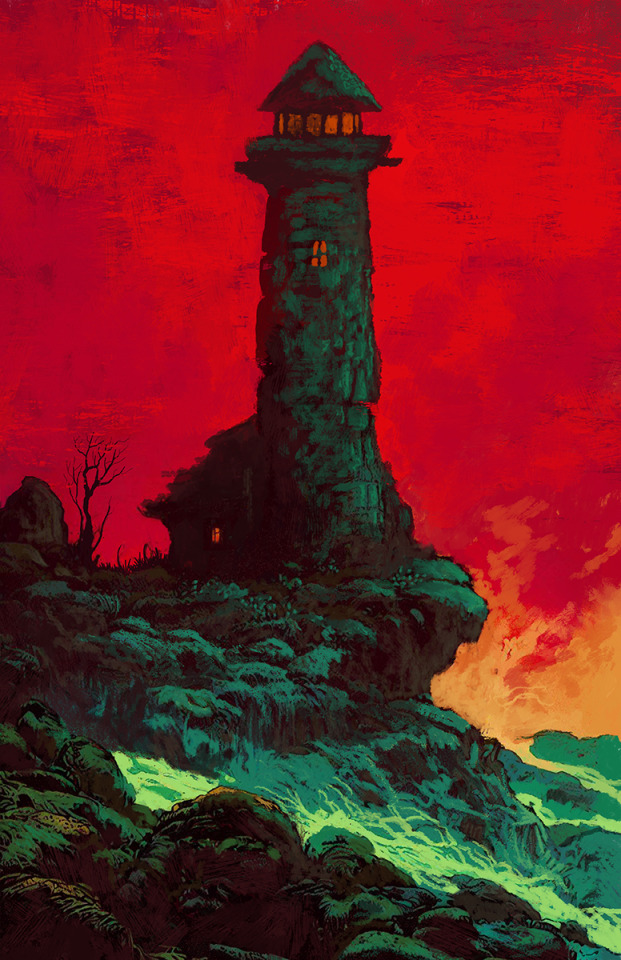
Lighthouse illustration for a ttrpg book I'm working on.
#lighthouse#illustration#mnart#fantasy art#d20#dungeonsanddragons#concept art#landscapepainting#art#haunted house#ghosts#osr#ose#retrod&d#dugeonmastersguide#dungeon#dungeonsynth
12K notes
·
View notes
Text
So I checked out Whalefall
I saw this recommended and thought "oh another dungeon crawler based on 1970s D&D. Wait inspired by Darkest Dungeon, Below (okay these make sense), also Disco Elysium and Dark Souls?? Alright I'll check it out, don't expect anything from it-

Alright you have my attention

So yeah, in going one step further from the meatgrinder tradition of classic dungeon delving, you literally play a ghost that body hops when you die. Also a very unusual use of a hex map for a game, as the dungeons you explore are basically two dimensional, and each floor is one dimensional; you go from hex to hex in a line, similar to Darkest Dungeon. Keeps it easy to track at least, and also hints that it's not the layout of a floor, but the composition of each room and hex (which are all randomly rolled when you uncover them) that matters.

A tabletop rpg with a difficulty selection. I gotta admit, that's a first for me. Also with the way some of these rolls are and needing to roll under, a d12 is going to make them an absolute bitch to pull off, fitting for the highest "difficulty."

Ah yes, the corpse list. That's a thing.

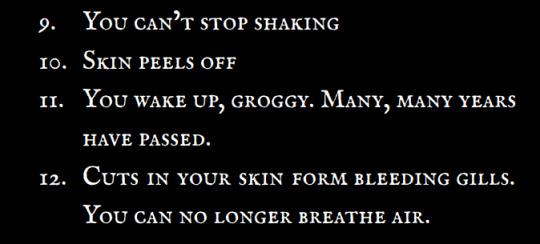
Many, many years have passed.


Probably the most metal part of this game, you literally fight the big dungeon boss while falling, to either be swallowed by the Depths forever, become the Crypt Worm, or climbing out, one floor at a time. Holy fuck
As with any classic style rpg, there are many, many tables to roll on, their unique contents being something I'll leave for the reader to discover for themselves.

Also, gang of 1d6 thieves. Something menacing to me about that.

Your spirit is basically your class. The one constant between bodies.

...William?
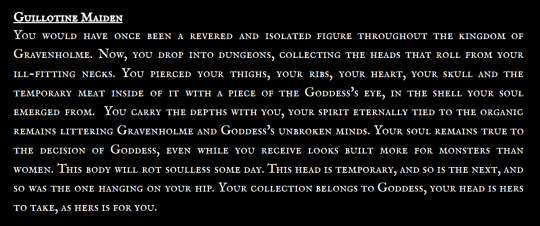

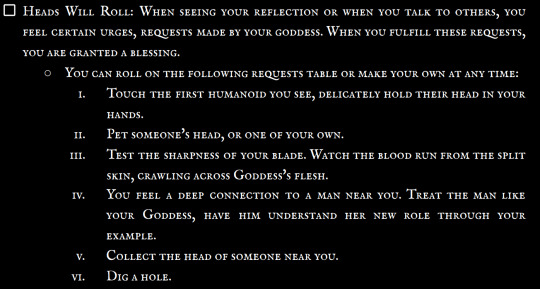
Oh hey found my favorite class. And very transgender too.

Also the fucking medic class levels up by killing the patient.

😨

yeah I can believe it
Anyway this shit rules
539 notes
·
View notes
Text
You've forgotten how long you've been doing this. Dungeon crawling. There is no longer a world above, just a mass of lines and colors, without end. With a rusted blade in hand, you drop down holes dug long ago, exploring ancient caverns with modern design. Rats, bones, worms, worms, worms. You'll find gold eventually.
Whalefall is a dungeon crawling system inspired by the OSR movement, Disco Elysium, and Fear & Hunger. If you're a fan of any of those or stuff like Dark Souls, Dungeon Meshi, Below, Darkest Dungeon, The Lighthouse, or working at a job in real life, you might like it (no guarantees).
416 notes
·
View notes
Text



City Streets Map Pack
Greetings everyone, welcome to another map pack! It features 12 total maps, including city streets, bridges, cathedrals and much more.
Patrons get access to gridded/ungridded and watermark-free maps. The grid size of each map is 30x40.
Check out the map pack here.







#battlemap#roll20#dnd#pathfinder#ttrpg#battlemaps#dnd stuff#dnd maps#wargaming#dnd5e#dungeons and dragons#dungeonsandragons5e#dungeon master#game master#vtt#vtt tokens#battle map#osr#cartography
491 notes
·
View notes
Text

career-ending injury
356 notes
·
View notes
Text
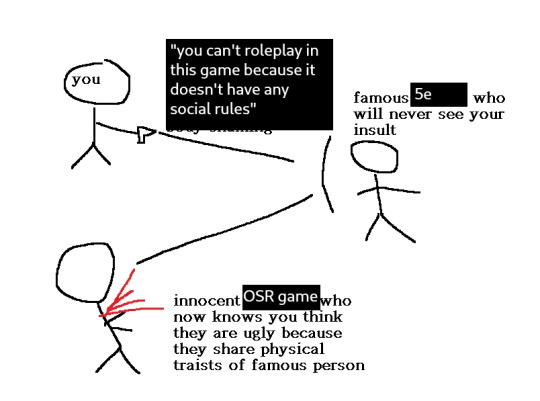
am i doing this meme right
406 notes
·
View notes
Text

"Is that… a human cub?" the brute thinks, staring.
#drawing#artists on tumblr#npc#bestiary#ttrpg#proceate art#procreate#clip studio paint#digital illustration#digital artist#art#draw#ilustración#osr#monster#ogre#juego de rol#role playing games#dnd#dungeons and dragons#artwork#character design#monster design#world building
29 notes
·
View notes
Text
There are good reasons even most OSR games don't use old-school "declare actions at start of round, then roll initiative with modifiers per action type" rules, but there's a certain je ne sais quoi that's only achieved when you don't know what order your actions are going to go off in until after the wizard says "I cast fireball".
2K notes
·
View notes
Note
My hasn't-played-anything-less-rules-heavy-than-Blades-in-the-Dark ass has today acquired an OSR style game rulebook. (Black Powder And Brimstone, if you're curious. Derived from Mork Borg, not that I'm very familiar) I was inspired to take the dive largely by yours and @thydungeongal's posts, so I now come to you asking for advice Namely, any general tips or advice for shifting my GMing paradime from the rather rules-loaded BitD, Lancer, and modern DnD into the OSR-style gameplay loop? How to structure a campaign, what sort of play experiences to be aiming for, mindset, that sort of thing? I've got some sense of it being not very narrative-centred, and about a bunch of driven fuckers stumbling around dungeons on their own initiative, and letting dice and Big Stupid Tables take the wheel, but it's all very broad-concept level stuff
I think @thydungeongal pretty much covered all the actually good advice, so let me just spout some nonsense:
Assume the powerful Wargamer Stance. Cast aside your pretensions, this isn't drama club, this is a game. Backstories happen during the first few levels. If someone doesn't feel like naming their character before they've survived a few levels, that's fine, I've done it myself. Put obstacles in front of your players and don't expect them to succeed or fail. Never let your game hinge on any one character, whether player or non-player, surviving.
Nothing is certain. Everything is possible. Go forth and conquer.
149 notes
·
View notes
